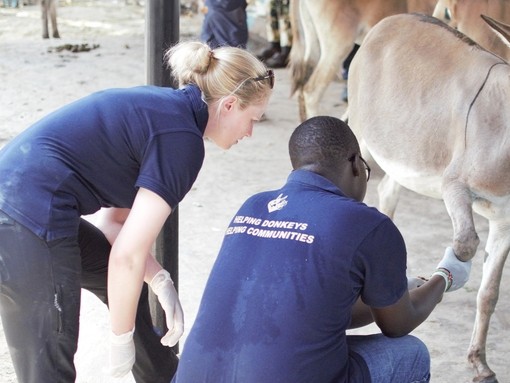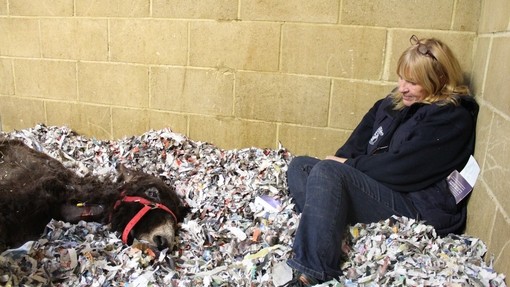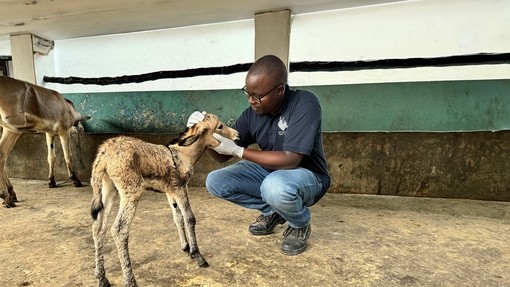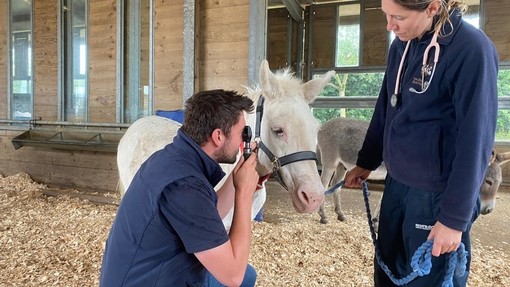
A day with Emma O’Hagan
“I realised my love for donkeys early on in my career, when I worked for a local private equine practice in East Devon who looked after many donkeys – including some from The Donkey Sanctuary. This was when I first came across the charity and their veterinary team. I then worked in the international team at World Horse Welfare which gave me experience of the charity sector and opened up a whole new area of interest for me, in managing international animal welfare projects with partner organisations. My role at The Donkey Sanctuary has now given me the opportunity to combine it all!
“In a typical week I do a couple of days of vet work, responding to emergency calls to see donkeys across our eight sanctuary sites or doing routine visits. These visits involve check-ups and seeing less urgent cases on a specific farm. Occasionally I will also join other vets to treat a donkey in the hospital too.
Caring for donkeys in the UK
“Older donkeys require a bit of extra care, particularly when it comes to their teeth, so you can see me here administering dental care to one of our geriatric donkeys, 23-year old Bella. One of her grooms noticed that she had a couple of loose incisors, which can be a painful experience.
“At our veterinary hospital we discovered that all of her lower incisors were loose, so we used local anaesthetic to numb the nerves around her teeth so that she couldn’t feel anything, and then carefully extracted each incisor over the course of a couple of hours, making sure they didn’t break and leave the tooth roots behind. Bella coped very well with the procedure, and was soon back out eating grass alongside her companion Lou Lou!

Delivering our work internationally
“In my remaining time my focus switches to our international programmes and partnerships, where I work with colleagues to review potential project plans and support project implementation.
“This means a lot of video calls to connect with teams and partners from around the world and occasionally visiting projects to monitor their progress and provide training. Most recently, I traveled to the island of Lamu in Kenya to visit The Donkey Sanctuary’s veterinary clinic and growing programme of work across the donkey-reliant communities in this region.”
The Donkey Sanctuary’s seafront clinic in the heart of Lamu town has been helping donkeys and owners since it opened its doors nearly 40 years ago. Lamu is Kenya’s oldest continually inhabited town, more than 700 years old and is home to more than 6,000 donkeys. The streets are narrow – often little more than arm’s length – meaning that travelling by car is impossible. Donkeys are the backbone of the economy here. Without motorised vehicles, donkeys are relied upon to move goods, building materials and people around the town.
“This visit was a fascinating insight into the activities of the clinic, and an opportunity to see our tetanus and rabies vaccination campaign first hand and workshop the next stages of the programme’s development with our country team. With a fatality rate of almost 100% in humans and animals alike, rabies remains a global threat in communities like Lamu. There is no cure, so prevention is vital, which is why our programme works to vaccinate not just donkeys and mules but companion animals like dogs too which transmit the disease, as part of our ‘one welfare’ approach. We know that what saves animals, will save humans too.
“During my time in Lamu I also helped provide training to a couple of our new vets, and learned lots from them too about the veterinary conditions seen in Lamu and experiences working in resource-limited places; all things that help my development in this role and better equip me to support projects in the future.

A champion for working equines
“There is so much that I enjoy about my role – it really is fulfilling and I love meeting and working alongside people from all over the world. There is a disproportionately low number of vets caring for working equines, so I am proud to support the community-based vets that are.
“It is inevitable in this line of work that you are going to see donkeys with welfare concerns. Working donkeys and mules are often owned by marginalised and vulnerable communities and their struggles are palpable. This is difficult to see, especially when you can’t immediately make everything better, but I truly believe that the work that we do, to try and make sustainable improvements to donkey and mule welfare, means that the whole communities benefit as a result.”
Find out more about our donkey-facing teams
Share this page
Tags
- Blog












